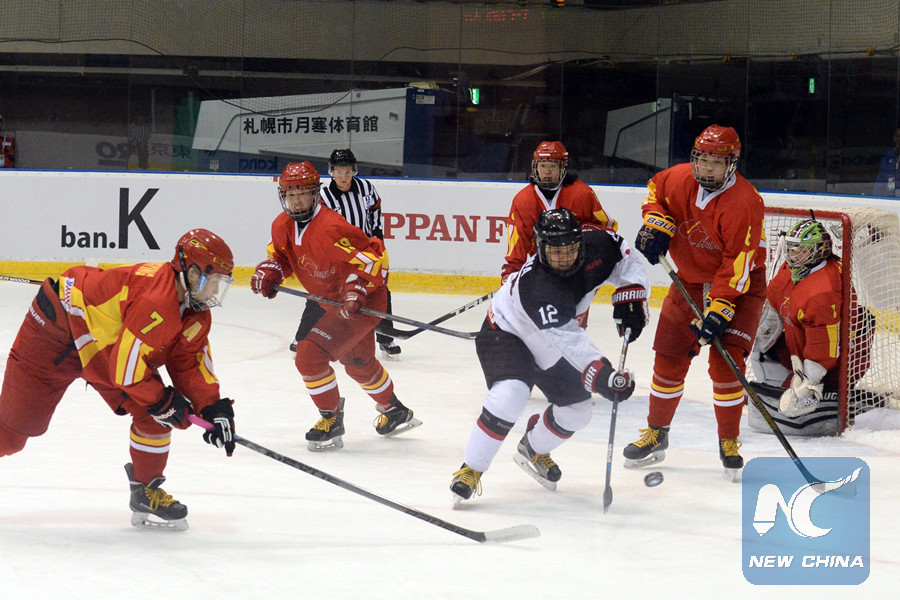
The Chinese women's ice hockey team finishes second at the Asian Winter Games which end on Feb. 26, 2017.(Xinhua)
SAPPORO, Japan, Feb. 26 (Xinhua) -- Whitewashed by South Korea 10-0 on Sunday, the Chinese men's ice hockey team ended its Asian Winter Games campaign with three straight losses, having scored none and allowed a total of 32 goals.
Head coach Hu Jiang blamed his team's poor performance on a lack of talent in Chinese ice hockey. "The national team does not have a pool of players from which to choose," he said.
The Chinese women's team, in contrast, did a much better job in the Games, finishing second, but its 6-1 loss to Japan on Saturday has exposed a huge gap between the two East Asian teams.
Chinese ice hockey has fallen into a vicious cycle: the lack of players leads to a low level for the sport in the country, and lackluster performance on the part of domestic teams drives away potential ice hockey aspirants and audiences.
There are only three professional men's teams in China - Qiqihar, Harbin (both from Northeastern China's Heilongjiang Province) and Beijing. As for women's team, there is only one - in Harbin, despite the women's game being introduced to China in 1984.
The official website of the International Ice Hockey Federation shows China with 1,101 registered players of both genders, while Japan has nearly 20,000.
"How can we develop women's ice hockey in a country which has only around 100 players?" complained Yu Tiande, head coach of the Chinese women's team.
According to coach Hu, South Korea has the pool of talent necessary to form three or four national men's teams, while China can barely group together a single team.
Yu Baiwei, captain of the Chinese women's team, said the national team has always lowered its qualification standard to allow in very young players, because there are few talented players to choose from.
"Compared to the Japanese women, the Chinese team members are young and inexperienced," she said.
A lack of competition at home was another reason given for the poor performance.
Seeley Richard Edward, head coach of the Chinese women's team, said his team played quite a lot of practice games while training in Canada. "But once we returned home after the Asian Games, we had few games to play and form soon dipped," he complained.
Hockey side Qiqihar, from which the Chinese men's team is built, competes in the Asian league, and went 4:38 this season to place last among eight participants.
China is now looking eastwards for inspiration.
The Japanese women's team, currently ranked seventh in the world, fell after the 1998 Nagano Olympics, missing three straight Olympics since. By raising the intensity of camped training and competing in more international games, Japan bounced from an all-time low to qualify for the 2014 Olympics in Sochi.
Japan team manager Hosoya Taeko admits 2014 was the turning point.
"The Sochi Olympics has changed our players' life," she said. "They are no longer worried about where or how to earn money. They are famous now. Because of them, more young people are taking up the sport."
In a bid to shine in the PyeongChang Olympics, South Korea took corners by stuffing naturalized players to the men's team.
Yu Tiande, manager of the Chinese teams, suggests China should start to develop grassroots and youth game immediately and at the same time learn from the neighboring countries.
"With five years to go before the 2022 Beijing Winter Games, China should lay out a long-term development plan for ice hockey," said Yu.
"I hope China will no longer be a pushover in five years and become a team to be reckoned with in one or two decades," he added.

